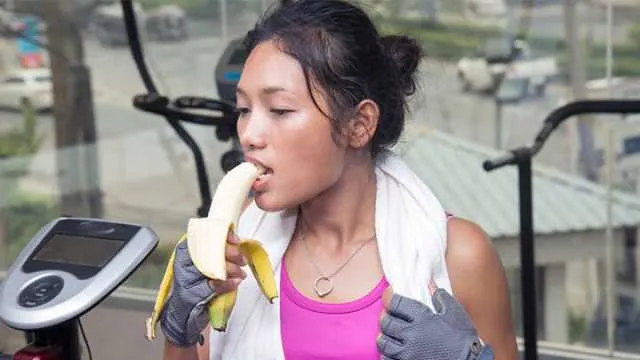
- Share on Facebook40
- Share on Pinterest
- Share on Twitter
So, you’ve started on a new exercise plan… most excellent! You’re doing a wonderful thing for your body and mind, as I’m sure you know. Perhaps your plan involves daily walking. Perhaps it is a moderate exercise routine three times per week, with some weights or a gym ball. Or, maybe you’re going full throttle and diving into vigorous exercise.
While deciding to take on an intense exercise program is excellent, there are some things you should be aware of. First, make sure not to push yourself too fast or too hard. You don’t want to injure yourself, so only go as hard as your body can handle, and then work your way up from there. Second, you’ll want to make sure to have plenty of carbohydrates on hand. Not just for breakfast… but for during, or right after, your workout.
Carbs are important to eat during intense exercise
Most people know that carbohydrates give us energy — they’re a breakfast staple for a reason. If you’re doing an intense workout, however, a new study out of the Queensland University of Technology suggests that you may want to eat carbs during your workout or right afterward. Why, you ask? Well, according to the researchers, eating carbohydrates may help to keep your immune system at its best during those vigorous sessions.
According to the co-author of the study, Dr. Jonathan Peake, intense exercise can be hard on the immune system. Dr. Peake explains:
“Exercise is a form of stress and more vigorous exercise creates more physiological stress which causes physiological and biochemical changes in the body. To tackle the potential threats these changes highlight, the immune cells may simply move out of the blood stream to the lungs, for example. This still leaves our bodies vulnerable to infections and, generally speaking, the more strenuous the exercise, the longer it takes for the immune system to return to normal.”
On the difference between moderate exercise and intense exercise on the immune system, Dr. Peake adds:
“Epidemiological evidence suggests that regular moderate exercise protects against upper respiratory illnesses, like the common cold, whereas regular intense exercise increases the risk of upper respiratory illnesses.”
Take measures to protect your body

This doesn’t mean that you shouldn’t exercise intensely. It just means that you need to take proper measures to protect your body. On this matter, study co-author Dr. Oliver Neubauer states:
“The consumption of carbohydrates before and during strenuous exercise not only improves endurance performance, but it can also minimize exercise-related immune disturbances. Consuming carbohydrates in the first few hours immediately after strenuous exercise also helps to restore immune function. This is especially important in situations where the recovery duration between two consecutive exercise sessions is short, which is often the case for athletes.”
As to why carbs during exercise work the way they do, Dr. Peake elaborates:
“Among various nutritional strategies to counteract immune depression during exercise recovery, carbohydrates have proven the most effective. Ingesting carbohydrates during vigorous exercise may help, because carbohydrates maintain blood sugar levels. Having stable blood sugar levels reduces the body’s stress response, which in turn, moderates any undesirable mobilization of immune cells.”
A few delicious and nutritious sources of carbs

Skip the workout powders and bars. Those often contain a host of unsavory additives (unless you make your own from whole ingredients). Instead, munch on some of these carb-laden healthy foods:
- Bananas
- Potatoes
- Sweet potatoes
- Oatmeal
- Pumpkin
- Lentils
- Beans
- Quinoa
- Grapefruit
- Strawberries
- Mango
- Raisins
- Apples
Now that you have your healthy carb-heavy snack and meal shopping list, get out there and enjoy your workout!
– Tanya Mead
- Share on Facebook40
- Share on Pinterest
- Share on Twitter

